Gardening Community After Conflict
 Connor Christensen, MPP/MA’24, a Military-Affiliated Fellow, studied at the Harris School of Public Policy and the Center for Middle Eastern Studies at the University of Chicago. Darren Colby, MSCAPP’24, studied at the Harris School of Public Policy and the Department of Computer Science. They used their grant for the project Gardening Community After Conflict to implement a sustainable communal agriculture model in Caquetá, Colombia. This region has experienced decades of conflict, but the 2016 peace accord offers hope. Many farmers are still struggling to transition away from the forced cultivation of illicit crops. Connor and Darren worked with the local government and Amazonia University to establish safe and efficient means of growing, distributing, and selling coffee, cacao, plantains, and other local produce at a price that provides a happy and healthy life for all.
Connor Christensen, MPP/MA’24, a Military-Affiliated Fellow, studied at the Harris School of Public Policy and the Center for Middle Eastern Studies at the University of Chicago. Darren Colby, MSCAPP’24, studied at the Harris School of Public Policy and the Department of Computer Science. They used their grant for the project Gardening Community After Conflict to implement a sustainable communal agriculture model in Caquetá, Colombia. This region has experienced decades of conflict, but the 2016 peace accord offers hope. Many farmers are still struggling to transition away from the forced cultivation of illicit crops. Connor and Darren worked with the local government and Amazonia University to establish safe and efficient means of growing, distributing, and selling coffee, cacao, plantains, and other local produce at a price that provides a happy and healthy life for all.
September 10, 2023
Our Davis Project for Peace with International House has officially come to an end, but our work continues. We have learned and grown so much by spending these months with the people of Vereda Bocana Agua Caliente in Morelia, Colombia, and we couldn’t be happier with the progress that has been made. Thanks to the dedication of volunteers and leaders throughout the village council, Caqueta Chamber of Commerce, Colombian National Training Service, and the Primo grocery store chain, we have successfully implemented two hydroponic gardens, run entirely by solar power, that supply tomatoes, melons, and peppers to the local community. The village received incredible sustainability training from leading experts in the field, and the hydroponic technician continues to volunteer his time to the community as they master the art of soil-free gardening. The success of the hydroponic model in this rural farming community has ignited excitement in neighboring localities, local businesses, regional media, and Colombian universities. People have realized how simple and effective the hydroponic model can be, with this potential future for agricultural flourishment diminishing any past contention with neighbors or any thoughts of a return to illicit cultivation. It is clear to us from responses from people at all levels of society that the excitement about the future has washed away any embers of desire to return to the past conflicts. While it would be foolish to say that one community garden has changed the course of Colombia, it is with full confidence that we say that this is a step in the right direction.
We will continue working in the coming year to tell the story of this amazing village and seek additional funding for implementation of this model for other communities in need. We would like to give a very special thanks to Hector Valderrama, Ignacio Sanchez, Ediberto, and John. Without your dedication to the project, none of this would have been possible. Additionally, words can’t express how grateful we are to International House at the University of Chicago and to Davis Projects for Peace for allowing us this opportunity. You all made this happen.

Members of the village, including John (the man in the hat, who was gracious enough to let us sleep in his home on many a night), work diligently to support the growth of the tomatoes with twine.

Additional UChicago students made their way to the remote village in order to support us with the garden project, including Joe Quinn MPP ‘24 and Rimjhim Agrawal MPP ‘23.
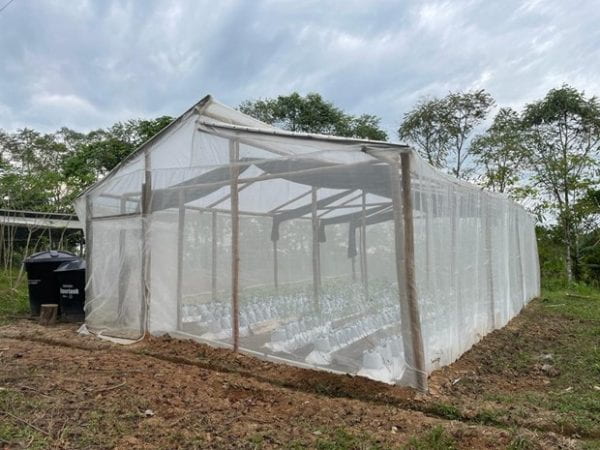
Here is a full view of what one of the hydroponic gardens look like. The water tanks pictured on the left feed into hoses via a pump and timer every 30 minutes to hydrate the plants. The root systems of each plant are held within a bag of small stones, bleach, calcium powder, and other nutrients. The wood for the frame of the garden was collected from local trees.
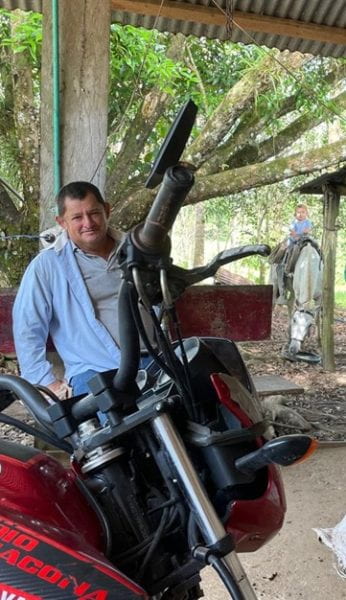
Hector Valderrama, president of Vereda Bocana Agua Caliente, pictured here with his motorcycle in the foreground, and John’s 18-month old son, John Jr., pictured in the background on his noble steed.
August 2, 2023
This week we had the pleasure of taking part in a community council meeting in which 54 members of the village discussed the latest opportunities and challenges they’re facing in their lives. Unsurprisingly, the hydroponic garden was a big topic. Its promise of providing a sustainable and locally-sourced food supply has sparked excitement and enthusiasm. However, as with any ambitious project, challenges and concerns have arisen during its construction phase.
During the council meeting, many residents expressed their excitement about the potential benefits of the hydroponic garden. They emphasized its potential to reduce dependency on outside food sources, increase the availability of fresh produce, and generate additional income from the grocery store contract. A general consensus was that the garden is not only a step towards environmental sustainability but also an opportunity to strengthen community ties.
On the other hand, there were some concerns raised such as the time it will take from other work that needs to be done in the community and whether or not this “new technology” is really going to work. There was a mostly failed garden project done by a grant from USAID a few years ago, so it’s no surprise that there are doubts. Addressing these concerns we explained that there’s only a couple of hours of maintenance required a week for the garden, and it will produce new income and opportunity for the people, especially the young people, in the community. The vast majority of the people are excited for this new agricultural venture, and those that are most excited constitute enough hands to make garden work viable.
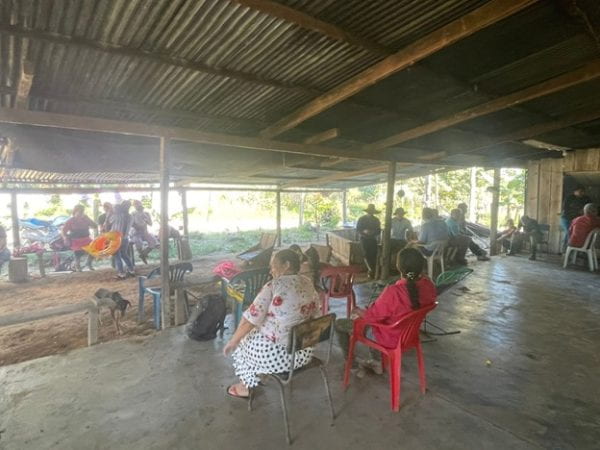
July 25, 2023
We are happy to say that we have broken ground on the garden! After some logistical challenges, we were able to get the beginning materials shipped out to the remote village. As shown here in the photos, the men of the community all came together to assemble the structure that will soon be a hydroponic garden for all. In the spirit of our project, we had people of all ages involved in the process, setting the precedent for future communal work. The next steps will be having a representative from both the grocery store and the National Training Service come out to install the more technical elements of the garden and to begin training the community members on the technical and sustainable elements of this style of growing. Darren is also happy to say he’s had the privilege of getting to work intimately with the community members through assisting in the morning milking of the cows and interviewing people such as the local priest, local store owner, and a local woman with firsthand experience of the Colombian conflict. Bringing this community together has already been a major success, and we’ve already noticed increased participation from community members as the supplies have started to arrive. Here’s to continued progress over these next 5 weeks!

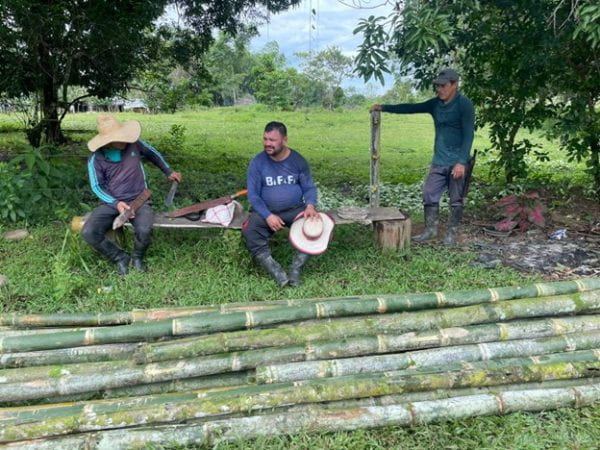
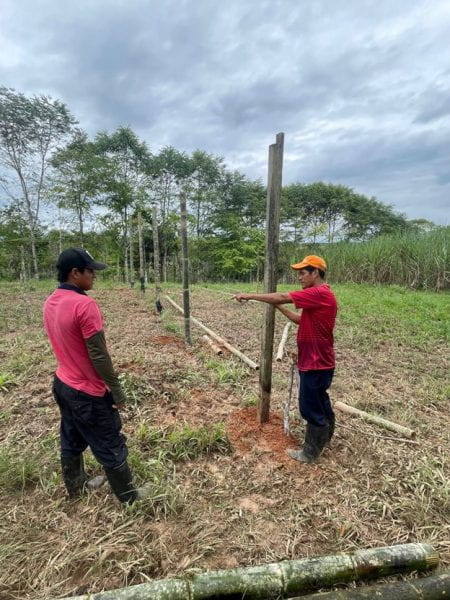
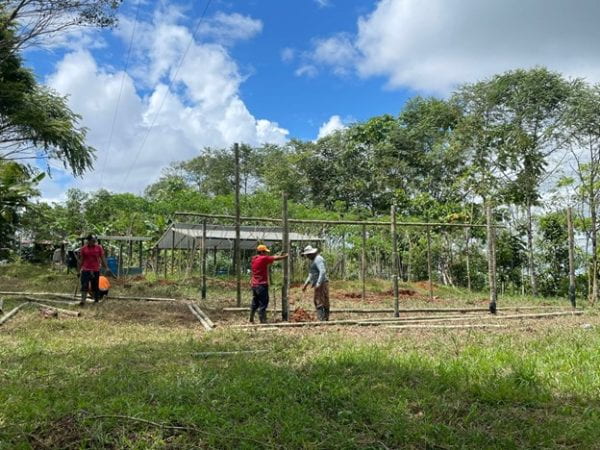
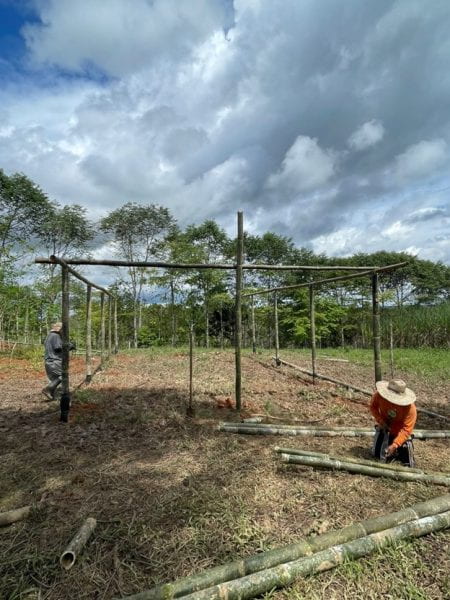
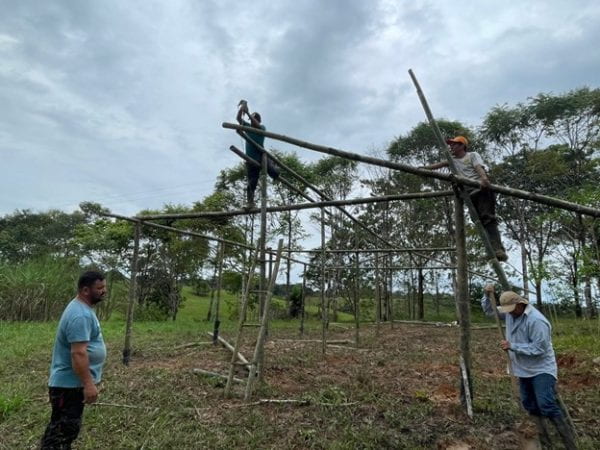
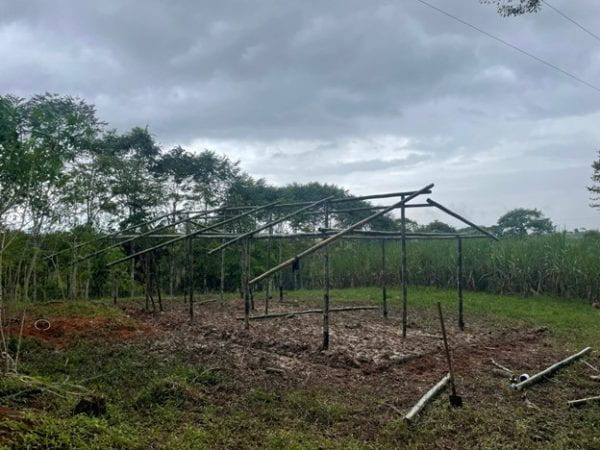
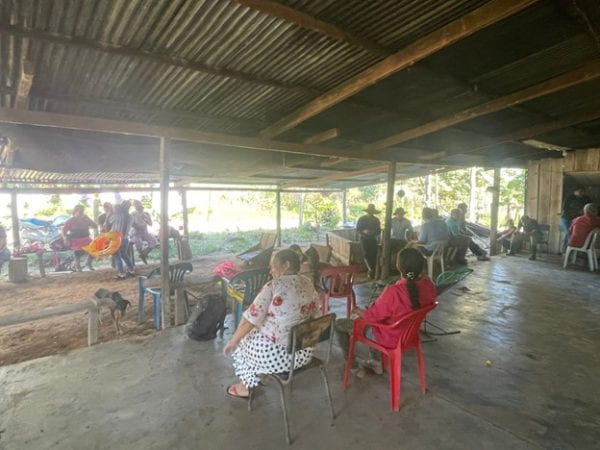
July 3, 2023
Our biggest hurdle in the village now is getting the supplies for the hydroponic garden bought, delivered, and installed. It looks like it’ll be another week before we’re all set up. Socially, we would say that everything has been a great success so far. We’ve been able to conduct a number of life history interviews with members of the community, we are engaging almost daily with the mayor, and we have found a digital artist interested in helping us realize a photo book about the village’s story.
We had a bit of free time this last weekend, so we were able to connect to a group of 15 local pensioners going for a hike up into the mountains about a two-hour drive from Florencia. We hiked through dense jungle, cow pastures, and pouring rain, up to an impressive waterfall. According to the local guide, we were the first foreigners to ever swim in the waters of this great fall. Along the way we really enjoyed talking to the retired locals. We learned a great deal from them about the local economy and the area’s history with conflict. They all seemed thrilled to have foreigners coming to work in and enjoy the region. The consensus is that bringing in international tourism to the area will be a much needed boost to the local economy. Personally we would love to encourage all our international friends to come enjoy the beauty and tranquility of Caqueta’s wilderness. This place is incredible.
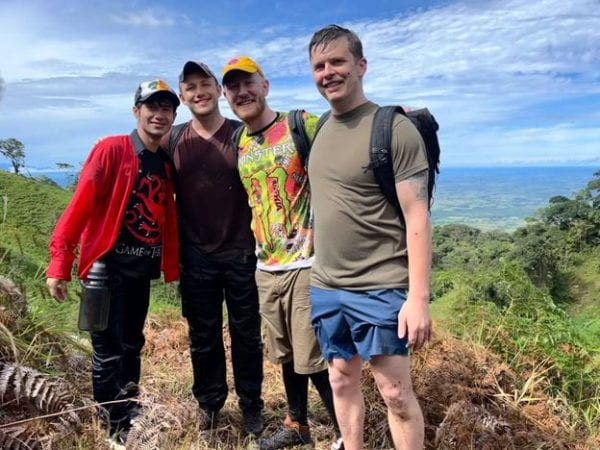
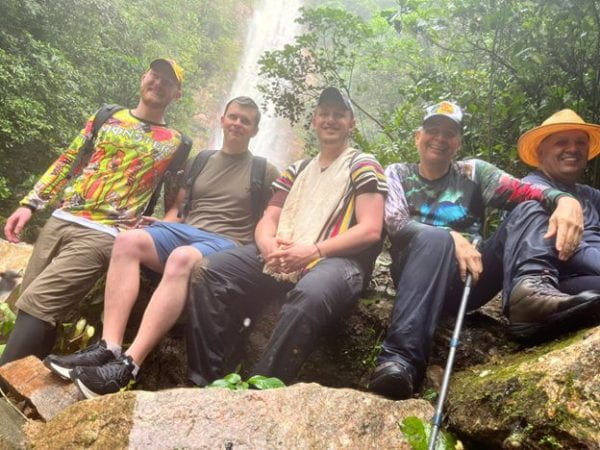
June 26, 2023
After getting to spend a couple of nights with the farmers in the village, we headed back to Florencia to put a few finishing touches on the logistics of the garden. Lucky for us, the grocery store we’re working with, Primo, has an amazing team working in the space of sustainable agriculture. We had the honor and privilege of getting to take a tour of Primo’s growing facility just outside of the city. Our tour was led by Edilberto, the grocery store’s gardening expert, and Juan Guillermo, the business expert for the grocery store. Our first big surprise was that Primo mostly focuses on hydroponics, the technique of growing plants using a water-based nutrient solution rather than soil. In general, hydroponic production systems are used by small farmers, hobbyists, and commercial enterprises. Edilberto explained to us and the village mayor, Hector, that this system basically only requires two hours of general upkeep and nutrient insertion per day. Hector seemed very impressed. Juan Guillermo went on to explain the economics of Primo’s smaller projects like this. As this part of Colombia experienced more conflict in the past, many of the local farmers have not fully reincorporated themselves into the markets for non-illicit crops, meaning that other parts of the country are preferable for big-scale grocery store chains. This has created the opportunity for Primo to move into the local market in Caqueta with the intention of helping small scale growers succeed in the new post-conflict marketplace. With everything we heard, we’re convinced that Primo is dedicated to peace and prosperity in the region.
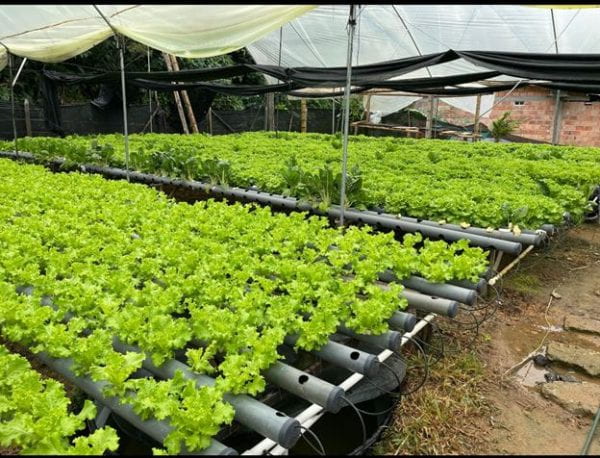
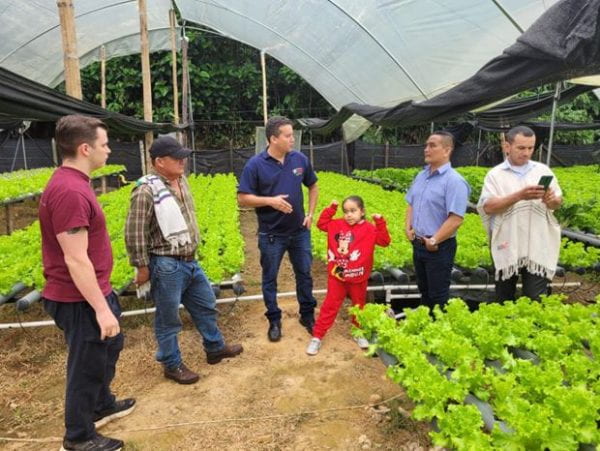
June 10, 2023
After a couple of flight delays due to the rainy days of June in Caquetá, we finally arrived. We were warmly greeted by our friend Ignacio who works in the local Chamber of Commerce. The President of the Chamber invited us to his office for some coffee and to discuss our shared vision. We even had the pleasure of being interviewed by a local news team. The real fun started once we arrived in the community. Vereda Agua Caliente is a group of 150 farming families that produce primarily milk. Cows are the pride of this region of Colombia, with the Caqueteños always boasting that their area has more cows than people. Aside from dairy, the locals produce plantains, cassava, cacao, corn, and various vegetables. Cars are not to be found in this rural region as horses are still the primary means of transportation. I felt as though I had been transported back to the farms I always heard about in the stories of my grandmother’s childhood in the early 20th century. Nobody has a television. The leader of the community, Hector, warmly greeted us, showing us all around the land. We surveyed the plot they have dedicated to the community garden, and we spent time getting to know the different families in the area. These are genuinely good people. We spent the first night in the home of one of the families, sharing meals with them and talking about their lives and ambitions. Early next week we’ll be meeting with the National Training Service so that we can work out the remaining logistics and break ground. The project is off to an exciting start.
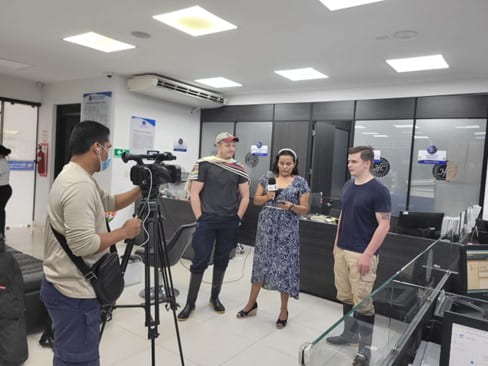
Connor and Darren being interviewed at the Chamber of Commerce in Florencia, Colombia by the local news agency, Lente Regional.
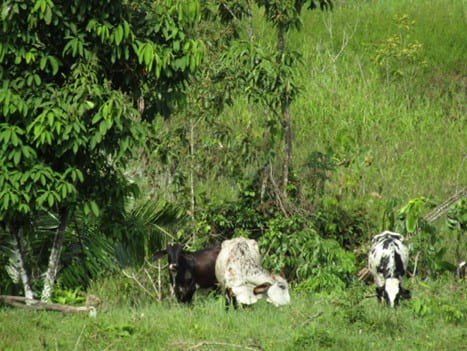
Cattle are the pride and joy of the people of Caquetá. These are three of the countless cows that call Vereda Agua Caliente home.
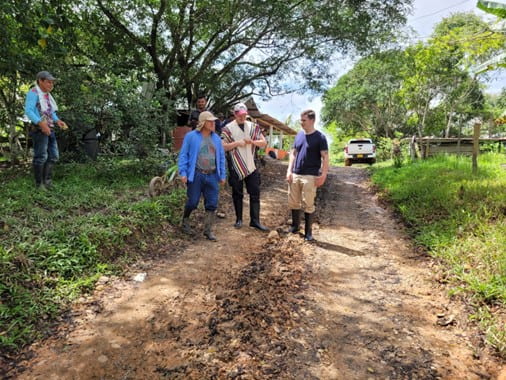
Connor and Darren taking a tour of the land with local leader Hector.
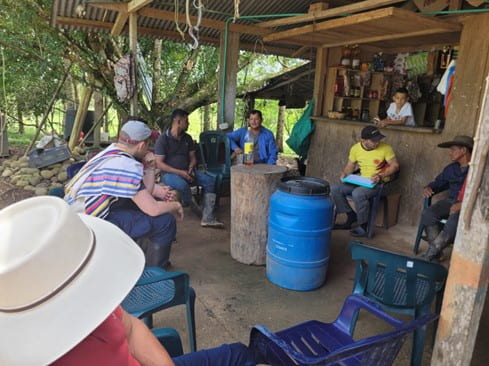
This local store serves as the community center for all things social. It is run by a man named John and his family, with whom we had the pleasure of spending our first night.
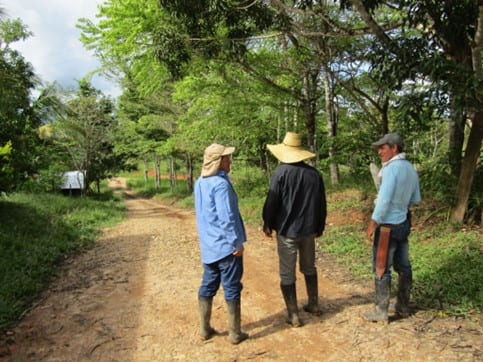
Hector with two other local farmers, on their way to show us the local lagoon.
May 24, 2023
Bocana Agua Caliente and the Grocery Store Vegetables
It’s less than two weeks now until we depart for Colombia, and the project is coming together beautifully. After a great deal of speaking to local leaders and authorities, we have found a welcoming village for the Gardening Community After Conflict project.
Bocana Agua Caliente is a community of 150 people, located just 90 minutes by dirt road from the municipal capital of Morelia. They are almost entirely agrarian and are excited about the prospect of securing stable prices for their crops. As we have been planning out the community garden with the community’s mayor (pictured below with the cattle) we have secured additional support from the Colombian National Training Service (SENA). They are a public institution aimed to develop vocational training programs for the Colombian labor force as a means to increase the competitiveness of Colombia's enterprises. After a representative from SENA (woman pictured below, white shirt) went to visit Bocana Agua Caliente, she concluded that this would be an ideal location for a project that partners with a local grocery store chain. The grocery store project guarantees a highly competitive price for tomatoes, lettuce, and cucumbers. As we move forward in a couple weeks with laying down the soil for the community garden, the cultivation of tomatoes, lettuce, and cucumbers will be at the center of our efforts. If the community successfully comes together and delivers the vegetables to the grocery store, SENA will then offer the community even larger projects. In the meantime, we will be working to foster even further reaching trade opportunities for the people of Bocana Agua Caliente. Additionally, we will be carrying out interviews with the majority of the adults in the community in order to help tell their unique story throughout the Colombian Conflict. We are especially interested in the twelve community members that are ex-FARC and learning what the peace process has been like for them. To say the least, we are anxious to get started.


April 11, 2023
In the summer of 2022, Connor was given the opportunity through the London School of Economics to work in the remote region of Caquetá, Colombia. This agrarian terrain on the edge of the Amazon has been home to some of the most continuous conflict Latin America has seen in the last decades. The Revolutionary Forces of Colombia (FARC), a communist militia, fought for change from 1964 until 2016. A peace accord was signed between FARC and the government, but there is still lingering distress throughout the country. Tens of thousands have been displaced, drug cartels threaten to move in on the illicit coca market the FARC once controlled, and families are going hungry.
As former members of the United States military, Connor and Darren have seen the aftermath of conflict in the eyes of fellow veterans, in the streets of the Middle East, and most recently in the stories on the ground in Latin America. Their personal experiences coupled with their study of Public Policy drives a passion for formulating structures of lasting change at the grassroots level. With their project, Gardening Community After Conflict, they plan to invest in a community garden model that can be replicated across the region. For purposes of sustainability, Connor and Darren are meeting regularly with local government officials, university experts, foundations, and regional farmers’ market coordinators so that this summer’s work can all be a part of a grander plan in Colombia, working towards peace and prosperity for all.
Connor and Darren will continue to post over the coming months as they work through this critical planning stage and finally break ground in June. Please check in for regular updates!
